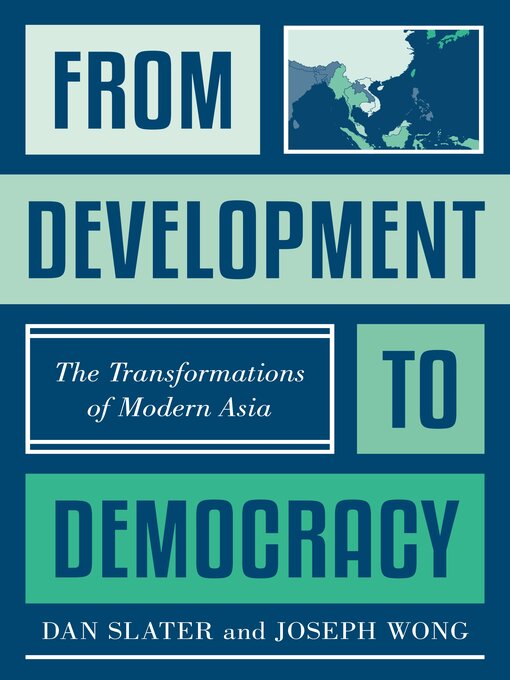Why some of Asia's authoritarian regimes have democratized as they have grown richer—and why others haven't
Over the past century, Asia has been transformed by rapid economic growth, industrialization, and urbanization—a spectacular record of development that has turned one of the world's poorest regions into one of its richest. Yet Asia's record of democratization has been much more uneven, despite the global correlation between development and democracy. Why have some Asian countries become more democratic as they have grown richer, while others—most notably China—haven't? In From Development to Democracy, Dan Slater and Joseph Wong offer a sweeping and original answer to this crucial question.
Slater and Wong demonstrate that Asia defies the conventional expectation that authoritarian regimes concede democratization only as a last resort, during times of weakness. Instead, Asian dictators have pursued democratic reforms as a proactive strategy to revitalize their power from a position of strength. Of central importance is whether authoritarians are confident of victory and stability. In Japan, South Korea, and Taiwan these factors fostered democracy through strength, while democratic experiments in Indonesia, Thailand, and Myanmar were less successful and more reversible. At the same time, resistance to democratic reforms has proven intractable in Singapore, Malaysia, Hong Kong, China, Vietnam, and Cambodia. Reconsidering China's 1989 crackdown, Slater and Wong argue that it was the action of a regime too weak to concede, not too strong to fail, and they explain why China can allow democracy without inviting instability.
The result is a comprehensive regional history that offers important new insights about when and how democratic transitions happen—and what the future of Asia might be.
-
Creators
-
Publisher
-
Release date
September 6, 2022 -
Formats
-
OverDrive Read
- ISBN: 9780691231075
-
EPUB ebook
- ISBN: 9780691231075
- File size: 3270 KB
-
-
Accessibility
Publisher statement (EPUB)
The publisher provides the following statement about the accessibility of the EPUB file supplied to OverDrive. Experiences may vary across reading systems. After borrowing the book, you may download the EPUB files to read in another reading system.
Summary
This publication has been produced to meet accepted Accessibility standards and contains various accessibility features including concise image descriptions, a table of contents, a page list to navigate to pages corresponding to the print source version, and elements such as headings for structured navigation. Appearance of the text and page layout can be modified according to the capabilities of the reading system.
Ways Of Reading
Appearance of the text and page layout can be modified according to the capabilities of the reading system (font family and font size, spaces between paragraphs, sentences, words, and letters, as well as color of background and text).
All content can be read as read aloud speech or dynamic braille.
Has alternative text descriptions for images.
Conformance
The publication contains a conformance statement that it meets the EPUB Accessibility and WCAG 2 Level AA standard.
This publication claims to meet EPUB Accessibility 1.1 WCAG 2.2 Level AA.
Navigation
Table of contents to all chapters of the text via links.
Index with links to referenced entries.
Page list to go to pages from the print source version.
Additional Information
Page breaks included
-
Languages
- English
Loading
Why is availability limited?
×Availability can change throughout the month based on the library's budget. You can still place a hold on the title, and your hold will be automatically filled as soon as the title is available again.
The Kindle Book format for this title is not supported on:
×Read-along ebook
×The OverDrive Read format of this ebook has professional narration that plays while you read in your browser. Learn more here.
